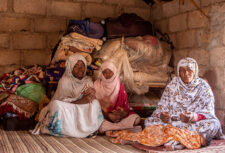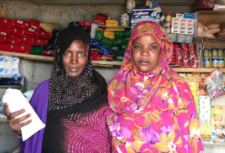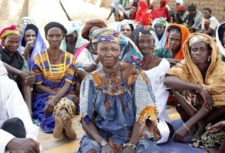Disclaimer: This article is more than 14 years old, and may not include the most up-to-date information or statistics. Please verify information with more recent sources as needed, and if you have any questions contact our Press Office.
22 May 2009
SOS Esclaves have been awarded the 2009 Anti-Slavery Award for nearly 15 years of fighting slavery in Mauritania, a country where an estimated 18 per cent of the population, or 600,000 people, are born and continue to live in slavery.
Receiving the award on Wednesday 27 May 2009 at Chatham House in London on behalf of the organisation is SOS Esclaves president, 64-year-old Boubacar Messaoud.
Boubacar Messaoud is himself the son of slaves and was one of the first people to denounce slavery in Mauritania. He has also been imprisoned three times for fighting against slavery in his country.
As recently as 2 April 2009, Boubacar was targeted as an anti-slavery activist and narrowly avoided death after being beaten unconscious by police at a rally in Mauritania’s capital Nouakchott.
Boubacar said: “Slavery in Mauritania is a hidden practice but exists everywhere. Just because people are not in chains or publicly beaten by their masters does not mean they are free. The only thing that slaves know in Mauritania is slavery. All they know is their masters.”
While slavery in Mauritania has existed for centuries, today virtually all cases involve Hratine (Arabic speaking descendants of black Africans captured into slavery by Arab-Berber ‘White Maures’ hundreds of years ago) owned by White Maures masters.
Those who are still in slavery are born as slaves, are inherited as property by their masters and receive no payment for their work. Slaves are expected to work every day. Men and children care for their master’s animals, which are usually camels, cows, and goats. Female slaves generally work from before sunrise to after sunset, caring for the master’s children, fetching water, gathering firewood, pounding millet and other domestic tasks.
Female slaves are frequently beaten and raped by their masters. Their children are also considered the master’s property and, along with other slaves, can be rented out or loaned or given as gifts in marriage.
Over the years SOS Esclaves has helped hundreds of former slaves, while its activists have faced harassment, threats and even imprisonment for speaking out about slavery and campaigning for its end.
There have been several attempts to end slavery in the country, including the decree to end slavery in 1981, which made Mauritania the last country in the world to officially abolish the practice.
In 2007 the same year as Mauritania’s first free and democratic elections, and after a hard fought campaign by SOS Esclaves, supported by Anti-Slavery International, slavery was finally criminalised by the new government.
However, the military coup of August 2008 has brought a halt to the progress made against slavery and renewed violence against anti-slavery campaigners. On 6 June, the leader of the coup, General Mohamed Ould Abdel Aziz is expected to win presidential elections, which are being boycotted by opposition parties.
Romana Cacchioli, Anti-Slavery International’s Africa Programme co-ordinator, said: “Despite the hard fought victory to criminalise slavery in 2007 the new law has not resulted in a single conviction. We are concerned that the lack of progress since the coup last August and the targeting of Boubacar Messaoud in April indicate that the new regime is looking to try and sweep the issue of slavery once more under the carpet.”
Case study of a former slave in Mauritania
Kheidama Mint Barka, aged 48, said: “I was born a slave. I would look after the family‘s animals all day long. I would take the sheep to get water in the morning and in the afternoon I would take the camels. I never took a break and I was never allowed to rest.
“I would come back home in the evening completely exhausted. Sometimes I was so tired I would become clumsy and would make silly mistakes and I would be beaten by the mistress’s youngest son. Sometimes to punish and frighten me I would be left down the well. My mistress’s oldest son would also rape me. I always had to be at his disposal.
“Since I have been freed I have been earning a living with small jobs, preparing millet and providing other services for people. At least now I am paid for the work I do.”
To request a press pack on slavery in Mauritania, to arrange an interview or to attend the award ceremony, contact: Paul Donohoe, Anti-Slavery International Press Officer, 020 75018934p.donohoe@antislavery.org
NOTES TO EDITORS:
- Interviews: Boubacar (who speaks French and Arabic but will be accompanied by an interpreter) will be available for interview from Tuesday 26 May until Friday 29 May.
- Anti-Slavery International Awards 2009 ceremony details: The ceremony begins at 7pm on Wednesday 27 May 2009 at Chatham House, 10 James’s Square, London, SW1 4LE.
- Anti-Slavery International is the world’s oldest human rights organisation and campaigns for the eradication of slavery, exposing current cases, supporting local organisations to release the minimum 12.3 million people in slavery, and the implementation of international laws against slavery.
- SOS Esclaves was formed in 1995 to expose the realities of slavery in Mauritania, challenge the widespread acceptance of slavery and defend the rights of those enslaved.





